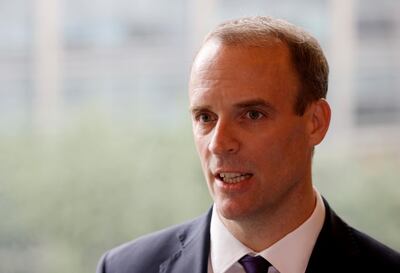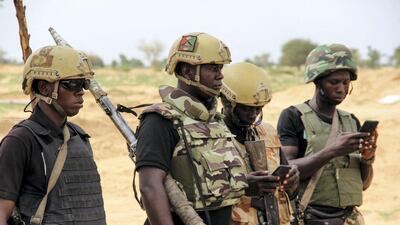Britain warned on Monday about the rising threat of ISIS in Africa as world powers plotted their latest moves against the terrorist group.
UK Foreign Secretary Dominic Raab told a summit of the US-led coalition against ISIS that "the threat from Daesh remains", using an alternative name for the group.
He told foreign ministers from more than 40 countries that Britain would pour an extra £12.6 million ($17.5m) into tackling ISIS in Africa, including on efforts to encourage fighters to leave the group.
The UK government highlighted concerns over the group's presence in West African nations including Nigeria, Cameroon, Niger and Chad.
"Let’s make no mistake, the threat from Daesh remains," said Mr Raab.
"The UK remains absolutely committed to its permanent defeat, working as part of the global coalition and Nato, and in partnership with the sovereign government of Iraq."
Ministers at the Rome summit held talks on on counter-messaging efforts against ISIS propaganda.
The terrorist group recently published a speech by its spokesman praising attacks carried out by its affiliates in Africa.
One affiliate in West Africa regularly boasts of violence against military and civilian targets, the UK government said.
Security experts say that cutting off ISIS propaganda is key to suppressing the group.
“If you stop their propaganda you choke off their religious influence and you will find yourself dealing with a smaller problem,” said Dr Bill Duff, a former Royal Ulster Constabulary officer in the counter-terrorist unit.
Dr Duff said the coalition should be prepared to spend at least 10 years working to dismantle ISIS by training local police and security forces.
The UK says some of its extra funding will go towards military efforts to combat ISIS and other groups in Africa.
Monday’s summit was chaired by Italian Foreign Minister Luigi Di Maio and US Secretary of State Antony Blinken, who was in Rome for the meeting.
Mr Blinken – who met Pope Francis before the summit – called for the coalition to expand its efforts in Africa.
The Central African Republic and Mauritania recently became its 82nd and 83rd members.
Mr Di Maio echoed concerns over Africa and warned of an "alarming phenomenon" taking place on the continent.
“We fear the expansion and spread of Daesh in Africa," he said.

Syrian remnants
ISIS lost its last territory in Syria in 2019, but Washington says the coalition needs to maintain pressure on the terrorist group’s remnants in the country.
Mr Raab highlighted concerns over violence at refugee camps and detention centres in north-east Syria.
Deteriorating conditions at the camps "represent a growing threat to security," he said.
Mr Blinken said that the 10,000 ISIS foreign fighters currently held in Syrian prisons could not be detained indefinitely by allies.
The top US diplomat said the depleted ISIS remnants in Iraq and Syria still had ambitions to carry out large-scale attacks.
He gave January's suicide bombings in Baghdad, which killed 32 people, as an example.
"We’ve made great progress because we’ve been working together," Mr Blinken said.
"So we hope to keep our eye on the fight, to keep up the fight against this terrorist organisation until it is decisively defeated."


